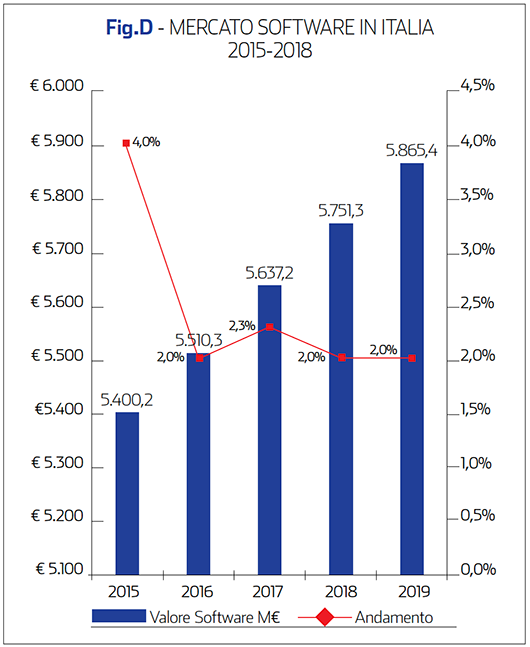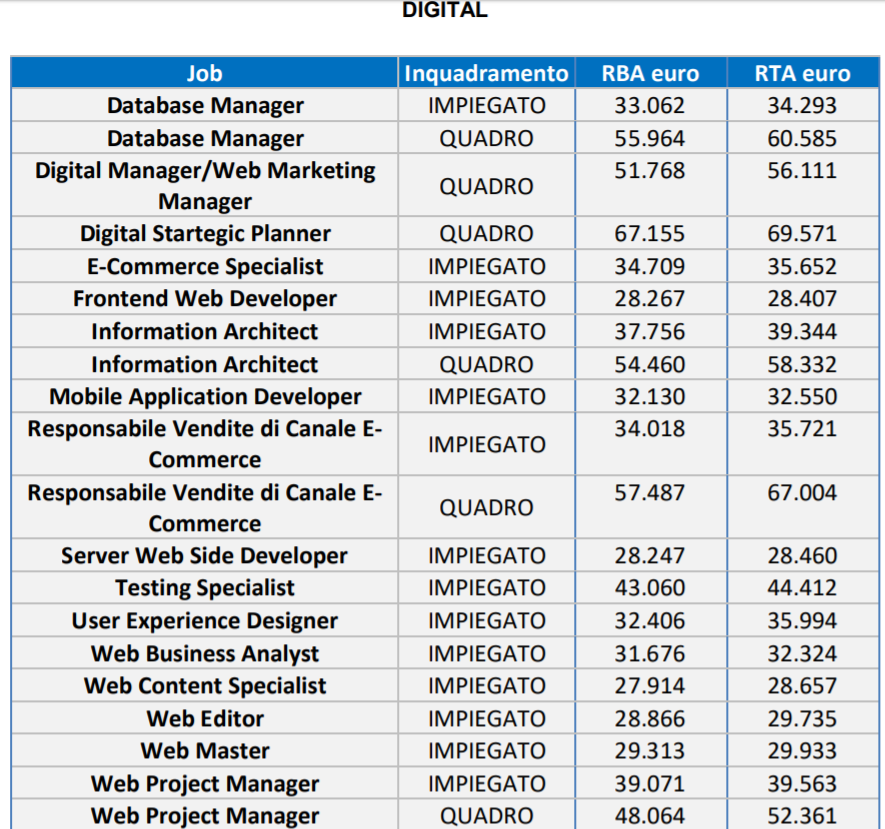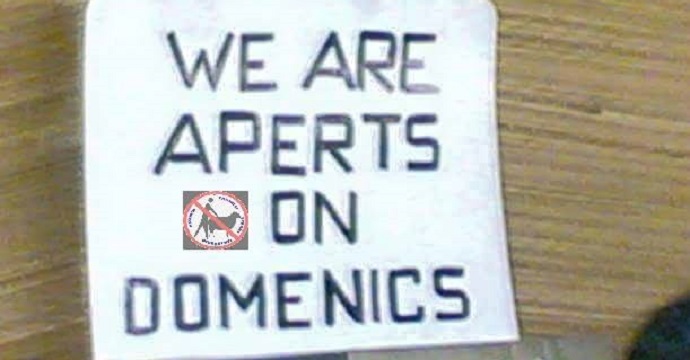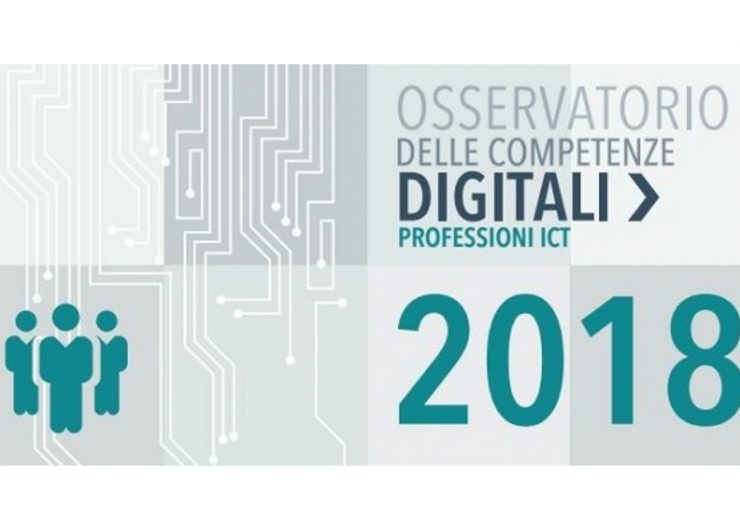IT in the zone .it
Hi Habr, today I want to present to the respected community a real “terra incognita” in the IT world.
This material is not a collection of statistics. This is a review of what the author sees around him and in what he has lived for many years.

Italy seems to be anything, in the eyes of many, but not a country with a developed IT sector of the economy. The sea, the sun, the beach and pizza with wine: most likely it will arise in the minds of many, if not most, at the word Italy, but not at all IT. In many respects this is true, but, as elsewhere, in practice, in this world, there are also some important nuances here.
Speaking about the development of the IT sector in Italy, you should not look into transcendental historical distances, and you can start looking seriously from 2014. From this year, in my humble opinion, the history of the modern Italian IT world begins: like many European countries, Italy in 2014 finally exhaled (cautiously) after two waves of the global economic crisis (the second wave of 2012-2014 was more local-South European) ) and, counting the losses, moved on. And at this very moment the IT sector of the Italian economy comes to life.
All those who are more or less familiar with Italy know that the main production facilities are located in the north of the country, while the south is more agricultural - beach-tourist than industrial. There were no miracles in the IT sector. In popularity among IT from the very beginning, Lombardy (Milan) is leading, in which 25% of all our IT people are concentrated. Lazio, thanks to Rome, finished second, followed by Piedmont, Veneto and Emilia-Romagna. The last region in the last two years confidently pushes competitors into the background, approaching the leader.
As for the rest of the regions, then, sadly to talk about it, everything is actually very sad. Of course, not to say that it is completely boring and dead, but not so good as to talk about any influence of local IT on other sectors of the economy. There are exceptions like Blumatica in Salento, but they only confirm the rule.
Some dry statistics:
In order to make it clearer what these figures represent in relation to the rest of the economy, I would note that all Italian IT makes up about 3.7% of the entire economy of the country.
Here, an important factor is that the country's economy itself is just the very micro, small and medium-sized enterprises and we are still more or less holding onto them here. Why? Yes, because it is they who work according to the principle “I have been working for 40 years now and do not want to change anything. In Italy, in general, the problem of “managers from the 60s” is very acute, which are very sensitive to any innovations in companies. Introduce there a new CRM or make in principle changes to SAP? We must be prepared for acute resistance, senseless and merciless. These gentlemen "teach" the younger generation to work, as a result of which we often get a young manager who thinks and works as if he is about 60 years old. We have to constantly meet and struggle with this.
The start, or rather the restart, of 2014 turned out to be quite good, new players appeared and disappeared, in 2015-16 we saw growth, development and decline of many IT start-ups, some of which survived in an amazing way.

Today, the growth of the IT sector, despite all the difficulties, is ahead of the general growth of the economy and amounted to more than 2% in 2018 (preliminary data), in 2019 an increase of more than 3% is expected.
What grows and is especially popular in our village? First of all, it is IoT and Cloud. These two directions grew and will grow in the coming years and the Germans are to blame for everything ... They actively began to promote the Industry 4.0 program in the EU, and Italy, following the example of Germany, actively picked up the idea and now we are developing the national program Azienda 4.0, built on the principles of the Industrial Internet of Things, Industrial Analytics, Cloud Manufacturing, under which the government actively develops and masters financing.
Top 10 Italian IT companies.
There is nothing surprising and the statistics looks like this:
times Source: economyup.it Honestly, I do not know how to comment on these figures and what to compare them with. 25 000 a year Milan and the same amount somewhere in Naples, this is a completely different money. In Milan, after paying for an apartment / communal there is enough for a very modest life and nothing more. In the south you will feel much better.


In this plan (salary / solvency level) the situation is similar to many countries where there is a very strict distinction between rich and poor regions.
Look at the prices? For example, like here with housing. The average apartment will cost about 450-650 euros per month. It depends on the region, location, development of infrastructure and quadrature. Not the fact that odnushka studio will cost you less, more likely even more expensive. The indicated price is valid only for the province of Bologna. In the south, for the money in take almost luxury apartments. In Rome and Milan ... I do not know ... room. One and. Communal is still about 100 euros per month. Very roughly calculated and much depends, again on the region. In the north in winter it will come calmly and to 200-250 euros. An average meal for two people will cost from 250 to 600 euros. It is no frills, given 1-3 times to dine out. In the south we divide by two, in the north we multiply by 1.5. Something like that.

Cadres decide everything? Probably yes, at least here they are very strongly localized.
According to the reports of Anitec-Istat, there are no more than 5% of foreigners working in the sector, and there are objective reasons for this, the first of which is that Italian companies prefer to hire their ex-students for work than to adapt to someone else’s mentality . Exceptions can only be foreign companies from the big hundred, or the ten that is presented above. Rare medium-sized galleys can hire a foreigner signor or middle. And you will have to pay more, most likely and there will be difficulties in understanding the new employee. Here I welcome all haters of national languages . In Italy, without the knowledge of Italian nothing to do. Even if you work in Milan, Microsoft or Google. Normally you will feel yourself only in the office. Then life stops and the further you go to the south, the more you just don’t understand. Yes, and you, too, stop understanding English aka-maccheronico. Already we start with the fact that the Italians, in the absolute majority of them do not pronounce the letter "h". There is no such sound in Italian. Slightly less, but most, have enormous difficulties with the pronunciation of the joints of all consonant letters. Well, the cherry will be that the native language of most Italians is not Italian, but a dialect. And not just regional, but communal, that is, dialect dialect, so to speak. And the farther to the south, the dialect has more differences from the state language. That is all as in China. Yes, in the north, in Trentino, for example, better to start a conversation in German right away, it will be easier. So, dialectal forms, absorbed with mother's milk, are very easy to enter not only in Italian pronunciation, but also in English. Hearing this is interesting, terrible to understand. Reading the code written by an Italian from somewhere in Basilicata is fine, in terms of linguistics and anthropology in general, but you can get carried away and forget why you read it at all and what it is. I think about this you need to write a separate article. why do you read it and what it is. I think about this you need to write a separate article. why do you read it and what it is. I think about this you need to write a separate article.

Last for today. How to get to work in Italy, if you are an IT person.
The first option is probably the fastest and easiest: we look at the announcements on the Italian resources, look for a vacancy and send a resume in English. Linkedin, or rather a well-filled profile on it, is actually a mandatory attribute for applicants. What are looking for. Data Scientist, Web Developer, Software Designer, Digital Officer, Chief Transformation, Mobile Developer, Data Architects, Master of Edge Computing ... As of December, 2018, these were the most popular vacancies. For PLs, JS, Java, C ++, Python were the most popular.
If everything is good, then the interested employer draws up the necessary permits from the Italian side and after a couple of months you apply for a national visa, upon arrival within 8 days you must apply for a temporary residence permit.
The second option. We are looking for university. We look at the conditions of admission, study, payment and submit documents. If we take for prestige, then it is universita 'di Pisa, Politecnico di Milano, universita' Sapienza (Roma), universita 'di Bologna. Kudos means both more rigorous selection and more expensive training. Although there is always a loophole that would pay a minimum (only tax) and also receive a scholarship. Fate start to earn money, and in the last courses you are already specifically looking for work. If you are not lazy, then you will have it by the end of your studies. It is not difficult to overtake the Italians here, as a rule, they are not in a hurry to find a job and are in no hurry to learn. The advantage of this option is that in 4-5 years of studying at the university you pull Italian up quite well and, most likely, you will begin to understand (speaks a little too) some dialect that will greatly expand your general horizons,
The third option is only for those who already live here. Open Partita Iva (such as individual entrepreneurship) is worth nothing. If you are yourself, then all expenses are about 10 euros, if with the help of an accountant, then about 200 euros, but he / she will fill in all the necessary modules and send where necessary. Yes, from the moment you come to an accountant or tax you can start working. All papers will come in a month, but you should hardly be bothered about this anymore. The discovery is not PI, but something of a larger type of SRL will be a bit more expensive and there will be a little more paper filling. Then immediately to the office of an accountant and he does it all, but you calmly start working. Taxation will depend on very many factors and tax regimes, of which there are several in Italy. If roughly, then from 19 to 45%. How much tax you pay here depends on your accountant.
What can you do. Anything you can do. Programming, network configuration, business support. Success will depend on your socialization. Especially at first.
I hope that someone read up to these lines. If it is interesting, then in the future I plan to analyze here some incidents of the life of IT in Italian reality.
This material is not a collection of statistics. This is a review of what the author sees around him and in what he has lived for many years.

Italy seems to be anything, in the eyes of many, but not a country with a developed IT sector of the economy. The sea, the sun, the beach and pizza with wine: most likely it will arise in the minds of many, if not most, at the word Italy, but not at all IT. In many respects this is true, but, as elsewhere, in practice, in this world, there are also some important nuances here.
Speaking about the development of the IT sector in Italy, you should not look into transcendental historical distances, and you can start looking seriously from 2014. From this year, in my humble opinion, the history of the modern Italian IT world begins: like many European countries, Italy in 2014 finally exhaled (cautiously) after two waves of the global economic crisis (the second wave of 2012-2014 was more local-South European) ) and, counting the losses, moved on. And at this very moment the IT sector of the Italian economy comes to life.
All those who are more or less familiar with Italy know that the main production facilities are located in the north of the country, while the south is more agricultural - beach-tourist than industrial. There were no miracles in the IT sector. In popularity among IT from the very beginning, Lombardy (Milan) is leading, in which 25% of all our IT people are concentrated. Lazio, thanks to Rome, finished second, followed by Piedmont, Veneto and Emilia-Romagna. The last region in the last two years confidently pushes competitors into the background, approaching the leader.
As for the rest of the regions, then, sadly to talk about it, everything is actually very sad. Of course, not to say that it is completely boring and dead, but not so good as to talk about any influence of local IT on other sectors of the economy. There are exceptions like Blumatica in Salento, but they only confirm the rule.
Some dry statistics:
Total subjects in the IT sector - 87,219, employed in the sector - 427,780 people.Here it should be noted that most firms are micro. small and medium-sized enterprises that make up more than 98%; There are not many big players, if you can say a little more than 0.1% of the total, but at the same time, they give 41% of the total IT product in the country.
including:
- hardware - 3,509 subjects and 56,903 employees
- Software - 18,795 entities and 138,550 employees
- Others (services, etc.) - 64,915 subjects and 232,327 employees
In order to make it clearer what these figures represent in relation to the rest of the economy, I would note that all Italian IT makes up about 3.7% of the entire economy of the country.
Here, an important factor is that the country's economy itself is just the very micro, small and medium-sized enterprises and we are still more or less holding onto them here. Why? Yes, because it is they who work according to the principle “I have been working for 40 years now and do not want to change anything. In Italy, in general, the problem of “managers from the 60s” is very acute, which are very sensitive to any innovations in companies. Introduce there a new CRM or make in principle changes to SAP? We must be prepared for acute resistance, senseless and merciless. These gentlemen "teach" the younger generation to work, as a result of which we often get a young manager who thinks and works as if he is about 60 years old. We have to constantly meet and struggle with this.
The start, or rather the restart, of 2014 turned out to be quite good, new players appeared and disappeared, in 2015-16 we saw growth, development and decline of many IT start-ups, some of which survived in an amazing way.

Today, the growth of the IT sector, despite all the difficulties, is ahead of the general growth of the economy and amounted to more than 2% in 2018 (preliminary data), in 2019 an increase of more than 3% is expected.
What grows and is especially popular in our village? First of all, it is IoT and Cloud. These two directions grew and will grow in the coming years and the Germans are to blame for everything ... They actively began to promote the Industry 4.0 program in the EU, and Italy, following the example of Germany, actively picked up the idea and now we are developing the national program Azienda 4.0, built on the principles of the Industrial Internet of Things, Industrial Analytics, Cloud Manufacturing, under which the government actively develops and masters financing.
Top 10 Italian IT companies.
There is nothing surprising and the statistics looks like this:
1 IBM Italia SpaSpeaking of Italian IT, you just can not get around the topic of salary. I already wrote somewhere in the comments that our Junior starts with a very small salary, by some standards, which in average for the country in June is 24,800 euros per year. In general, salaries over the last year have slightly increased (by 3%) and today everything looks like this, as shown in the following tables. two
2 Accenture
3 MICROSOFT Italia
4 Gruppo Engineering
5 SAP ITALIA Spa
6 Gruppo Reply
7 Gruppo Almaviva
8 ORACLE ITALIA
9 HPE
10 GRUPPO ZUCCHETTI
times Source: economyup.it Honestly, I do not know how to comment on these figures and what to compare them with. 25 000 a year Milan and the same amount somewhere in Naples, this is a completely different money. In Milan, after paying for an apartment / communal there is enough for a very modest life and nothing more. In the south you will feel much better.


In this plan (salary / solvency level) the situation is similar to many countries where there is a very strict distinction between rich and poor regions.
Look at the prices? For example, like here with housing. The average apartment will cost about 450-650 euros per month. It depends on the region, location, development of infrastructure and quadrature. Not the fact that odnushka studio will cost you less, more likely even more expensive. The indicated price is valid only for the province of Bologna. In the south, for the money in take almost luxury apartments. In Rome and Milan ... I do not know ... room. One and. Communal is still about 100 euros per month. Very roughly calculated and much depends, again on the region. In the north in winter it will come calmly and to 200-250 euros. An average meal for two people will cost from 250 to 600 euros. It is no frills, given 1-3 times to dine out. In the south we divide by two, in the north we multiply by 1.5. Something like that.

Cadres decide everything? Probably yes, at least here they are very strongly localized.
According to the reports of Anitec-Istat, there are no more than 5% of foreigners working in the sector, and there are objective reasons for this, the first of which is that Italian companies prefer to hire their ex-students for work than to adapt to someone else’s mentality . Exceptions can only be foreign companies from the big hundred, or the ten that is presented above. Rare medium-sized galleys can hire a foreigner signor or middle. And you will have to pay more, most likely and there will be difficulties in understanding the new employee. Here I welcome all haters of national languages . In Italy, without the knowledge of Italian nothing to do. Even if you work in Milan, Microsoft or Google. Normally you will feel yourself only in the office. Then life stops and the further you go to the south, the more you just don’t understand. Yes, and you, too, stop understanding English aka-maccheronico. Already we start with the fact that the Italians, in the absolute majority of them do not pronounce the letter "h". There is no such sound in Italian. Slightly less, but most, have enormous difficulties with the pronunciation of the joints of all consonant letters. Well, the cherry will be that the native language of most Italians is not Italian, but a dialect. And not just regional, but communal, that is, dialect dialect, so to speak. And the farther to the south, the dialect has more differences from the state language. That is all as in China. Yes, in the north, in Trentino, for example, better to start a conversation in German right away, it will be easier. So, dialectal forms, absorbed with mother's milk, are very easy to enter not only in Italian pronunciation, but also in English. Hearing this is interesting, terrible to understand. Reading the code written by an Italian from somewhere in Basilicata is fine, in terms of linguistics and anthropology in general, but you can get carried away and forget why you read it at all and what it is. I think about this you need to write a separate article. why do you read it and what it is. I think about this you need to write a separate article. why do you read it and what it is. I think about this you need to write a separate article.

Last for today. How to get to work in Italy, if you are an IT person.
- At the invitation of the company.
- Finish the local university, then master, and already in the course of the last years of study, look for work.
- Having a residence permit to open a business.
The first option is probably the fastest and easiest: we look at the announcements on the Italian resources, look for a vacancy and send a resume in English. Linkedin, or rather a well-filled profile on it, is actually a mandatory attribute for applicants. What are looking for. Data Scientist, Web Developer, Software Designer, Digital Officer, Chief Transformation, Mobile Developer, Data Architects, Master of Edge Computing ... As of December, 2018, these were the most popular vacancies. For PLs, JS, Java, C ++, Python were the most popular.
If everything is good, then the interested employer draws up the necessary permits from the Italian side and after a couple of months you apply for a national visa, upon arrival within 8 days you must apply for a temporary residence permit.
The second option. We are looking for university. We look at the conditions of admission, study, payment and submit documents. If we take for prestige, then it is universita 'di Pisa, Politecnico di Milano, universita' Sapienza (Roma), universita 'di Bologna. Kudos means both more rigorous selection and more expensive training. Although there is always a loophole that would pay a minimum (only tax) and also receive a scholarship. Fate start to earn money, and in the last courses you are already specifically looking for work. If you are not lazy, then you will have it by the end of your studies. It is not difficult to overtake the Italians here, as a rule, they are not in a hurry to find a job and are in no hurry to learn. The advantage of this option is that in 4-5 years of studying at the university you pull Italian up quite well and, most likely, you will begin to understand (speaks a little too) some dialect that will greatly expand your general horizons,
The third option is only for those who already live here. Open Partita Iva (such as individual entrepreneurship) is worth nothing. If you are yourself, then all expenses are about 10 euros, if with the help of an accountant, then about 200 euros, but he / she will fill in all the necessary modules and send where necessary. Yes, from the moment you come to an accountant or tax you can start working. All papers will come in a month, but you should hardly be bothered about this anymore. The discovery is not PI, but something of a larger type of SRL will be a bit more expensive and there will be a little more paper filling. Then immediately to the office of an accountant and he does it all, but you calmly start working. Taxation will depend on very many factors and tax regimes, of which there are several in Italy. If roughly, then from 19 to 45%. How much tax you pay here depends on your accountant.
What can you do. Anything you can do. Programming, network configuration, business support. Success will depend on your socialization. Especially at first.
I hope that someone read up to these lines. If it is interesting, then in the future I plan to analyze here some incidents of the life of IT in Italian reality.
